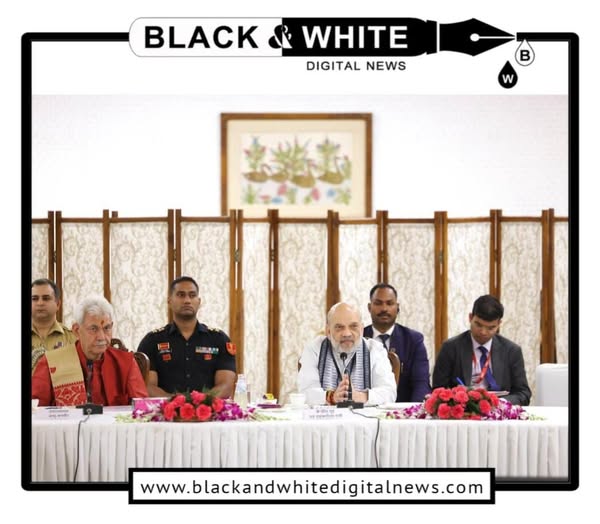Shah’s Strike: Anti-Terror Blitz Unleashed in Jammu & Kashmir as Separatist Walls Crumble.
||Black and White Digital News||
||Tejveer Singh April 09,2025 ||
Jammu/Srinagar:In a momentous escalation of counterterrorism strategy, Union Home Minister Amit Shah has lit the fuse on what is being hailed as one of the most comprehensive anti-terror offensives in Jammu and Kashmir in recent times. Sparked by a spate of recent deadly attacks in the otherwise relatively stable Jammu province—notably in Udhampur, Kathua, Reasi, Poonch, and Rajouri—Shah’s visit has culminated in a decisive pivot toward full-spectrum security enforcement, with symbolic and strategic overtones reverberating across the region.
High-Stakes Security Huddle at Raj Bhawan:
Chairing a high-level security review meeting at Raj Bhawan in Srinagar alongside Lieutenant Governor Manoj Sinha, Shah brought to the table the top brass of India’s security architecture: senior Army commanders, paramilitary officials, intelligence chiefs, and Jammu and Kashmir Police top officers. The atmosphere was grave, the mission clear—to annihilate the networks of terror that have once again begun to stir unrest in the region.
Declaring zero tolerance against the resurgence of militancy, Shah announced an aggressive escalation of anti-terror operations. His directive hinges on advanced vigilance, seamless coordination among security agencies, and cutting-edge intelligence synergy—a model Shah said had already “crippled terror in J&K” under Prime Minister Narendra Modi’s multi-pronged doctrine.
“Instructed to further intensify anti-terror offensives by advanced vigilance and seamless mutual coordination to achieve the goal of uprooting terror for good,” Shah posted on X (formerly Twitter).
Emotional Outreach and Symbolic Gestures:
Before locking horns with security officials in policy war rooms, Shah’s first stop was laden with emotional gravity. He visited the residence of Deputy SP Humayun Muzammil Bhat, a Kirti Chakra awardee, who was martyred in a treacherous terrorist ambush during a 2023 encounter in Kokernag’s Gadool forests. Spending nearly 20 minutes with Humayun’s father, retired IGP Ghulam Hassan Bhat, Shah extended condolences and reaffirmed the Government of India’s pledge to honor its fallen heroes.
This somber visit set the tone for what is being seen as a high-octane, deeply symbolic campaign to reclaim every inch of J&K from the grip of terror.
The Changing Terrain of Terror: Focus Shifts to Jammu:
Jammu, long seen as a stable outpost compared to the volatile Valley, is now firmly in the crosshairs of terror outfits. Intelligence reports suggest a strategic shift by anti-national elements to destabilize border districts like Kathua, Rajouri, and Poonch, taking advantage of forested terrain and proximity to infiltration routes.
Security has been ramped up dramatically in response, with armed personnel flooding urban and rural zones, checkpoints mushrooming across highways, and surveillance systems running round-the-clock. Srinagar itself resembled a fortress during Shah’s visit, with sweeping patrols and intelligence sweeps.
Cracks in the Hurriyat: Separatist Edifice Collapses:
In a dramatic political twist, Shah also announced that three more organisations—Jammu Kashmir Islamic Political Party, Jammu and Kashmir Muslim Democratic League, and Kashmir Freedom Front—have severed ties with the separatist conglomerate Hurriyat Conference.
“It is a prominent demonstration of the people’s trust in the Constitution of India within the Valley,” Shah declared on X.
With this, a total of 11 separatist-linked groups have publicly renounced their allegiance to Hurriyat, signaling a massive ideological shift within the Valley. Shah underlined that the trend was not only significant but historic, stating that Prime Minister Modi’s vision of a united and powerful Bharat has been further fortified.
Last month, groups including the Jammu and Kashmir People’s Movement, Democratic Political Movement, and Freedom Movement, among others, also disassociated themselves from separatist politics. On March 25, this wave began gaining momentum. By the end of the month, JK Tahreeqi Isteqlal, headed by Ghulam Nabi Sofi, and JK Tahreek-I-Istiqamat, led by Ghulam Nabi War, followed suit, leading to what many analysts are calling the “Hurriyat Disintegration Era.”
A New Chapter in J&K’s Story:
As Amit Shah wrapped up his engagements in Jammu and Kashmir, his message echoed with clarity and conviction: The fight against terrorism has entered its most decisive phase yet. With the political ecosystem of separatism collapsing and an emboldened security mechanism in motion, the region appears poised at a critical juncture.
The road ahead is fraught with challenges—cross-border infiltration, sleeper cells, radical networks—but the tone from Delhi is unambiguous: No compromise. No retreat. Total commitment.
In Shah’s own words, it’s no longer just about restoring peace—it’s about “uprooting terror for good”, and ensuring that every drop of sacrifice made by the region’s heroes translates into a future free of fear.



